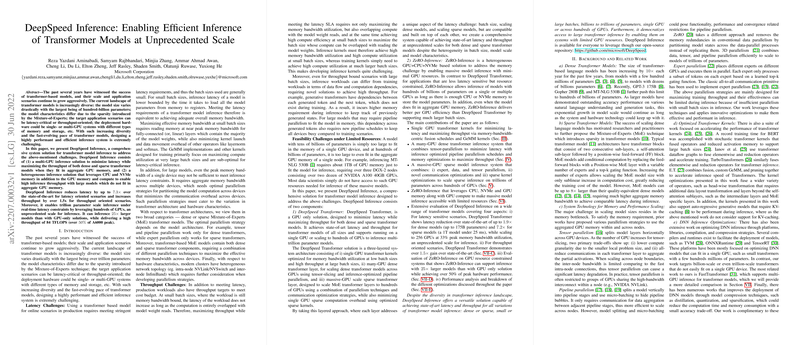Efficient Inference of Transformer Models at Scale
The paper "OURS: Enabling Efficient Inference of Transformer Models at Unprecedented Scale" addresses the challenge of designing highly performant and efficient inference systems for transformer models. Transformer-based models have grown significantly in size, with current models reaching up to trillion parameters. This growth demands diverse applications, such as latency-critical tasks and throughput-oriented tasks, which need to be deployed on single- or multi-GPU systems with various memory and storage types. As such, there is a critical need for a robust system capable of handling the evolving diversity in transformer models.
Key Contributions
The authors present "OURS", a comprehensive system designed to address these challenges by optimizing transformer model inference over multiple GPUs. The solution comprises two major components:
- Multi-GPU Inference Solution: This optimizes latency while maximizing throughput for both dense and sparse transformer models when logistical constraints allow models to fit within aggregate GPU memory.
- Heterogeneous Inference Solution: This leverages CPU, NVMe, and GPU resources to achieve high throughput when handling large models that cannot fit in aggregate GPU memory.
Key numerical results highlighted in the paper include:
- Up to reduction in latency over state-of-the-art for latency-oriented scenarios.
- Over improvement in throughput for throughput-oriented scenarios.
- Ability to perform trillion parameter scale inference under real-time latency constraints by utilizing hundreds of GPUs.
Technical Approaches
The paper details several technical strategies integrated into "OURS":
- Deep-Fusion: This technique addresses the latency issues associated with small batch sizes by fusing multiple operations, minimizing data transfer between GPU cores and global memory to reach peak bandwidth utilization for transformer kernels.
- Custom GeMM Kernels: For small batch sizes, custom General Matrix Multiplication (GeMM) kernels are employed to improve memory-bandwidth utilization and to seamlessly integrate within fused kernels.
- Inference Optimized Pipeline Parallelism: This approach reduces pipeline bubble overhead and improves scheduling efficiency, specifically for generative transformer models where execution time can vary between prompt processing and token generation stages.
Implications and Future Work
The proposed system, "OURS", not only meets existing requirements for efficient large-scale inference of massive models, but it also sets a foundation for future developments in AI. Transformer models will likely continue their growth in scale and complexity. Systems like "OURS" expand the accessibility of such models by supporting fewer resources and democratizing large model inference. Future work will undoubtedly focus on further improving the system's adaptivity, possibly through enhanced hardware-aware optimizations and more sophisticated network communication strategies.
In conclusion, "OURS" provides an expressive inference framework capable of dynamically managing and optimizing computational resources in line with varied and evolving transformer model requirements, marking significant progress in the domain of scalable AI model deployment.
